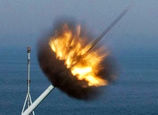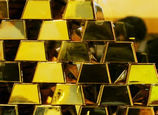
Scattering common-looking faint-yellow particles into oil-polluted seawater, and the oil disappeared and the seawater became crystal-clear dozens of hours later, which happened recently in a naval port of the Navy of the Chinese People's Liberation Army (PLA). The miracle-working particles are "oil-degrading bacteria" jointly developed by the Naval Medical Research Institute under the PLA Navy and Fudan University. The achievement was successfully tested in naval ports of the East China Sea, the North China Sea and the South China Sea respectively, and passed appraisal by experts recently in Beijing.
Starting with bio-remediation, researchers of the Naval Medical Research Institute under the PLA Navy successfully incubated and isolated highly-efficient oil-degrading bacterial strains and high-yield bio-surfactant bacterial strains from oil-polluted seawater, and succeeded in combining them and establishing highly-efficient oil-degrading colony of bacteria. They fixed the colony of bacteria onto suspensible microorganisms, creating an oil-polluted organism intensive- handling and remediation system. The system's petroleum hydrocarbon degradation rate can be up to over 90 percent.
More importantly, the system degrades oil into carbon dioxide and water which is harmless to environment. Besides, the system itself can be degraded in a few days, and therefore it needs no reclaim and causes no secondary pollution.
The successful test of the system makes a big difference in using bio-remediation technology to control oil pollution of sea areas of ports/docks and also has great significance in treatment and remediation of marine oil pollution.


















![]()
